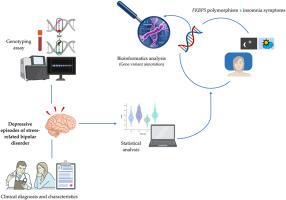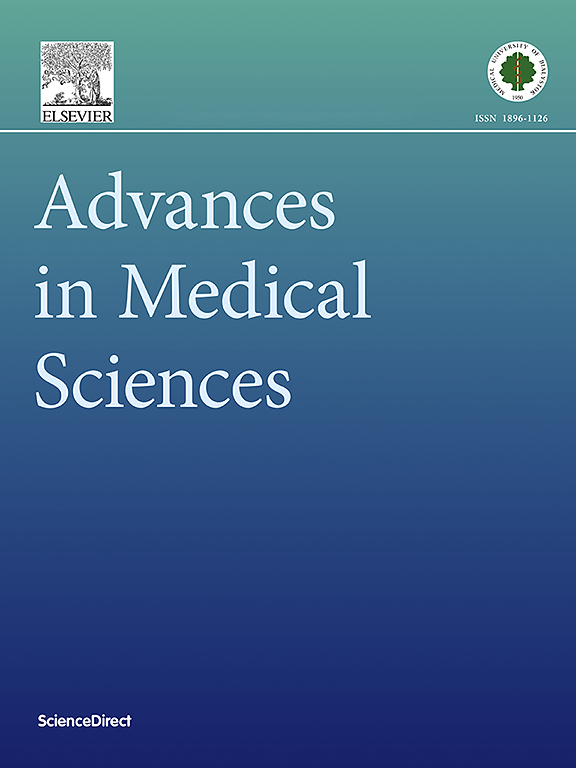FKBP5基因多态性与压力相关性双相情感障碍抑郁发作失眠症状的关系
IF 2.6
4区 医学
Q3 MEDICINE, RESEARCH & EXPERIMENTAL
引用次数: 0
摘要
目的:应激相关性双相情感障碍(BP)是由复杂的遗传、环境和临床相互作用引起的。虽然FKBP5(关键应激反应调节因子)与情绪障碍有关,但它在抑郁症发作期间失眠中的作用尚不清楚。本研究探讨了FKBP5多态性与BP抑郁发作期间失眠症状之间的关系。材料和方法:使用SCID、OPCRIT和TaqMan基因分型对8个FKBP5多态性进行评估,共347例BP患者(42%为男性,58%为女性,78%为失眠症状)。参与者根据首次发作前压力源的存在与否进行分组。使用Statistica 13.3和r进行统计分析(ANCOVA和卡方结合两两事后检验)。使用Ensembl VEP、RegulomeDB、HaploReg和SNPnexus对显著相关变异进行功能注释。结果:FKBP5 rs755658多态性可能与压力源个体的失眠症状有关,与TT相比,CT/CC基因型显示出更高的症状可能性(p = 0.03; bh调整p = 0.22,低于0.25阈值)。在没有应激源的受试者中,有7个多态性与BP亚型显著相关,提示遗传影响。预计rs755658变异会影响基因表达、转录因子结合和转录后调控。结论:这些研究结果表明,FKBP5基因变异可能影响存在压力源的睡眠障碍,突出了它们在BP抑郁发作期间的压力调节和失眠中的作用。鉴于该研究的探索性,研究结果应谨慎解释,并在更大的独立样本中进行验证。未来的研究应探讨其潜在的机制和治疗意义。本文章由计算机程序翻译,如有差异,请以英文原文为准。

Association of FKBP5 gene polymorphism with insomnia symptoms in the depressive episodes of stress-related bipolar disorder
Purpose
Stress-related bipolar disorder (BP) arises from complex genetic, environmental, and clinical interactions. While FKBP5(key stress response regulator) is linked to mood disorders, its role in insomnia during depressive episodes remains unclear. This study explores the association between FKBP5 polymorphisms and insomnia symptoms occurring during the depressive episodes of BP.
Materials and methods
A total of 347 individuals with BP (42 % male, 58 % female; 78 % insomnia symptoms) were assessed using the SCID, OPCRIT, and TaqMan genotyping for eight FKBP5 polymorphisms. Participants were grouped based on the presence/absence of a stressor before the first episode. Statistical analyses (ANCOVA and Chi-square with pairwise post hoc tests) were performed using Statistica 13.3 and R. Functional annotation of significantly associated variants was conducted using Ensembl VEP, RegulomeDB, HaploReg, and SNPnexus.
Results
FKBP5 rs755658 polymorphism may be associated with insomnia symptoms in individuals with stressors, with CT/CC genotypes showing a higher likelihood of symptoms (p = 0.03; BH-adjusted p = 0.22, below the 0.25 threshold) compared to the TT. Seven polymorphisms were significantly associated with BP subtypes in those without stressors, suggesting genetic influence. The rs755658 variant is predicted to affect gene expression, transcription factor binding, and post-transcriptional regulation.
Conclusions
These findings suggest that FKBP5 genetic variants may affect sleep disturbances with a stressor present, highlighting their role in stress regulation and insomnia during depressive episodes in BP. Given the study's exploratory nature, findings should be interpreted cautiously and validated in larger, independent samples. Future studies should investigate the underlying mechanisms and therapeutic implications.
求助全文
通过发布文献求助,成功后即可免费获取论文全文。
去求助
来源期刊

Advances in medical sciences
医学-医学:研究与实验
CiteScore
5.00
自引率
0.00%
发文量
53
审稿时长
25 days
期刊介绍:
Advances in Medical Sciences is an international, peer-reviewed journal that welcomes original research articles and reviews on current advances in life sciences, preclinical and clinical medicine, and related disciplines.
The Journal’s primary aim is to make every effort to contribute to progress in medical sciences. The strive is to bridge laboratory and clinical settings with cutting edge research findings and new developments.
Advances in Medical Sciences publishes articles which bring novel insights into diagnostic and molecular imaging, offering essential prior knowledge for diagnosis and treatment indispensable in all areas of medical sciences. It also publishes articles on pathological sciences giving foundation knowledge on the overall study of human diseases. Through its publications Advances in Medical Sciences also stresses the importance of pharmaceutical sciences as a rapidly and ever expanding area of research on drug design, development, action and evaluation contributing significantly to a variety of scientific disciplines.
The journal welcomes submissions from the following disciplines:
General and internal medicine,
Cancer research,
Genetics,
Endocrinology,
Gastroenterology,
Cardiology and Cardiovascular Medicine,
Immunology and Allergy,
Pathology and Forensic Medicine,
Cell and molecular Biology,
Haematology,
Biochemistry,
Clinical and Experimental Pathology.
 求助内容:
求助内容: 应助结果提醒方式:
应助结果提醒方式:


